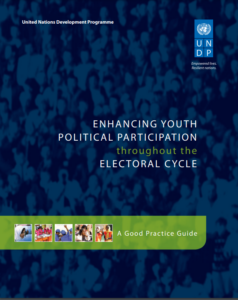Resource Title
Enhancing Youth Political Participation throughout the Electoral Cycle – A Good Practice Guide
Summary
Young people between the ages of 15 and 25 constitute a fifth of the world’s population. While they are often involved in informal, politically relevant processes, such as activism or civic engagement, they are not formally represented in national political institutions such as parliaments and many of them do not participate in elections. This can impact on the quality of democratic governance. Thus, this guide provides a youth-friendly legal framework that enables youth political participation.
Resource Details
Description
“Enhancing Youth Political Participation throughout the Electoral Cycle: A Good Practice Guide” marks United Nations Development Programme (UNDP)s first review of programming strategies for youth political participation beyond the ballot box. It identifies key entry points for the inclusion of young people in political and electoral processes and compiles good practice examples of mechanisms for youth political empowerment around the globe, focusing on innovative instruments with the potential to provide fresh inputs for UNDP programmes as well as initiatives by other stakeholder.
It identifies and compiles 21 good practice examples, in the Arab region and beyond, of initiatives for enhancing Youth’s participation throughout the electoral cycle: from youth engagement in civic and voter education (Central Asia, Cambodia, Tunisia and Australia), as candidates through youth sections of political parties (Kenya); to electoral monitoring of elections (Mexico).
This Guide is intended for different stakeholders (political parties, electoral management bodies, civil society organizations and UNDP practitioners) as guidance to UNDP programming in the context of long-term electoral assistance.
Available from:
Download Enhancing Youth Political Participation throughout the Electoral Cycle – A Good Practice Guide PDF

